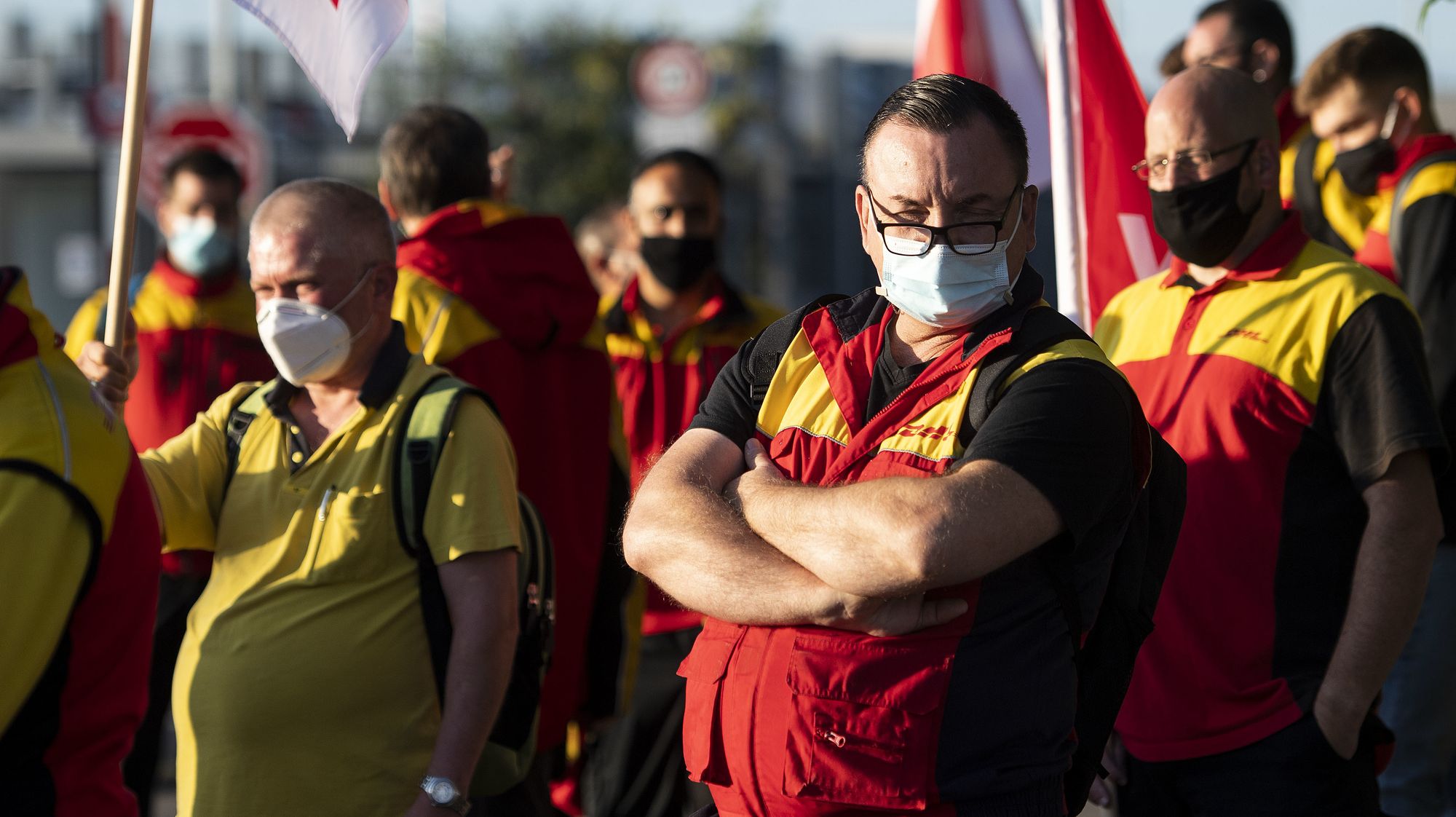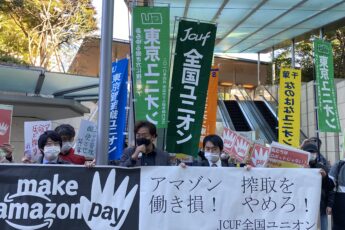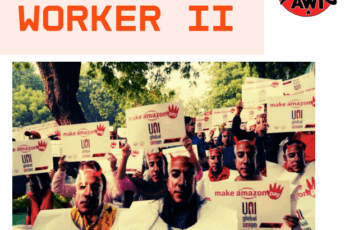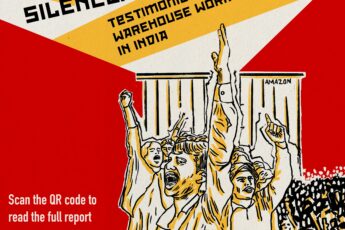
By Anonimous Ex-Worker at DHL Leipzig
We publish the English translation of a report made by an ex-worker at the DHL-Hub in Leipzig on the effects of the pandemic on working conditions, wages and capacity to organize. The report was first published in the Solidarisch Gegen Corona website, which is a repository of the struggles and grassroot initiatives taking place during the pandemic. The text is meant as the kick-off of a wider inquiry on the current situation in workplaces, in Germany and beyond, and on challenges we are facing in organizing and connecting with each other. While considered “essential”, with the excuse of the pandemic logistic workers are overly exposed to the risk of contagion, face demands of higher flexibility and see their working day stretched. The lift of the limits of overtime hours is telling of a general trend we are experiencing. DHL, like other logistics companies, are also allowed to require even more flexible shifts and longer overtime from temp workers, and this creates divisions between workers in the same hub. A collective response is needed. In order to foster processes of organization, it is important to exchange information on the current situation in different countries. We are therefore happy to share the initiative of our German friends and invite whoever wants to comment or contribute to write to solidarischgegencorona@riseup.net or get in touch with TSS.
I recently worked at the DHL Express Hub at Leipzig-Halle Airport in Schkeuditz (hereafter: DHL). With almost 6,000 employees, it is one of the largest private employers in the region. The hub is a central transhipment point for shipments sent by the worldwide express service of DHL. I worked mainly in the reload department. We resorted incoming shipments from around the world into new containers. For a short while, I worked in this department as well. The newly loaded planes then in turn head for destinations around the world. I started working at DHL in the fall of 2020, which also means that I only know the normal, pre-Covid state of affairs in the hub from my colleagues. I quit shortly before the second lockdown in Germany.
My resignation has nothing to do with COVID-19 per se, although I am happy to no longer expose myself to the risk of infection night after night. After all, Saxony became the sad frontrunner for COVID-19 cases during the second wave. The Hub hasn’t been a COVID-19 hotspot so far, as it was reported about Amazon facilities in Germany. However, several thousand people from different cities (especially Leipzig and Halle) and counties gather here every night, making it to a potential corona-cluster.
However, COVID-19 is by no means only affecting work through the risk of infection; it seems to me that the growing volume of freight in the pandemic is much more decisive. In early December, nightly freight volumes exceeded 630,000 shipments per night for the first time. 2020 was generally a record year for DHL, which accordingly made record sales.
To handle the freight, they hired new workers from the region, but also sought new recruitment through temporary employment agencies from other airports in Germany and from other countries in the EU.
To handle the freight, they hired new workers* from the region, but also sought new recruitment through temporary employment agencies from other airports in Germany and from other countries in the EU. In addition, overtime accumulated on the workers’ time accounts. No one knows when the workers will be able to take time off. It feels like most workers are reaching their physical and psychological limits in this situation.
Since DHL Express is not a classic e-commerce company, the connection between increasing online shopping and the pandemic is not as clear here as it is for Amazon. However, goods ordered online are also processed in the hub. I rarely encountered Corona-specific freight where the sticker on the package indicated e.g. mouth-nose protection masks as contents. In addition to consumer goods express letters, spare parts and medical goods play a major role.
I will show on five levels how the COVID-19 pandemic has affected work in the Hub: (1) Workforce Composition, (2) the Labour Process, (3) work frameworks: Time and Money, (4) Company Propaganda and (5) Struggle Conditions of the Workers. I want to discuss the last point further. I see a very conflictual situation here. Warehouses, which have been known for poor working conditions at Amazon at least since the global struggles, continue to operate in the pandemic without significant compensation or even an expansion of the co-determination possibilities of the workers*, who have to expose themselves to increased health risks and stress. At the same time, many workers in the logistics companies are dissatisfied with the present situation.
Changes of the Workforce Composition
In the wake of the global logistics boom, DHL in Leipzig continues to grow. Therefore, there is an immense demand for workers. Even before the pandemic, the company was running advertising campaigns for new workers* on streetcars, advertising pillars and large posters in various places all over Leipzig. However, the demand for workers* increased even more during the pandemic. In addition, they have doubled the bonuses in the “Make Friends into Colleagues” program. Here, you receive a bonus if you recruit new colleagues in your community. A new colleague who works more than 20 hours a week receives a one-time payment of €1,000 after completing her probation period.
The already existing shortage of workers is complicated by the fact that some colleagues had resigned due to dissatisfaction with the working conditions in the facility. Some of them changed to the new location of Amazon Logistics at the airport, where they hoped for a higher hourly wage and less workload. Colleagues strongly recommended that I should do the same. The reduced workload can be expressed in a number: At DHL, the maximum weight of a shipment is 31.5 kilos; Amazon advertises 23 kilos. DHL workers are in high demand by Amazon because they have already passed the background check by various government security agencies which is mandatory for working at a German airport. However, this can take several months, which prevents them from starting work quickly.
Some of the new colleagues had already lost their jobs during the pandemic, for example because stores and cultural institutions had to close. But DHL did not rely on the labour pool in the region, but also recruited workers from the south-eastern EU countries via temp agencies, as well as many workers who had been temp workers at other German airports until the pandemic. These workers have contracts of varying lengths, up to half a year. During this time, they live at the expense of their agency in empty hotels in the city centre. The workers from South-Eastern Europe consistently gave high unemployment in their home countries as the reason to work in the Hub.
The consequences of infection control in the workplace
First, I’d like to mention that DHL has never communicated current case numbers to the workforce until my resignation. I only heard rumours that there had been some isolated cases, but that they could not be linked to the work. Since the pandemic, masks have been compulsory in the workplaces, corridors, stairwells, and break rooms. Most recently, management has threatened to eliminate the smoking area, if workers do not stand in the marked circles while smoking, but “cuddle” with each other.
Masks must be worn when loading containers together with co-workers, which happens about 50% of the time. We wear the normal light blue cloth masks, which protects the others from us, but not oneself. However, I think DHL could afford better masks. But more expensive masks like FFP2 masks would also mean that breathing would be more difficult, and the workers would need more breaks. The masks that are handed out do not hinder breathing as much as one might think. However, I don’t have any lung problems either.
The mask requirement was not taken very seriously in the first few weeks of early autumn. However, this changed as the number of cases in the region increased. DHL was more insistent on enforcing the rules. In a team meeting – a fifteen-minutes meeting of workers at a station to evaluate the previous night and discuss the current one under the guidance of a “yellow vest” – one “yellow vest” warned us, that could get a notice if we were caught up without wearing a mask. Yellow vest is the nickname for workers in control positions who overgrow the other workers. The name derives from the yellow vests they wear. The “normal” workers wear orange ones. I didn’t see, though, that the yellow vests really control it; they rather warned us about the duty managers* who would keep an eye out if workers* got too close to each other unprotected while loading and unloading containers. The workforce was split by the different opinions about wearing masks. Some workers hated it and tried to take them off as often as possible.
Work frameworks: Time and Money
Increasing freight volumes without a corresponding increase in the workforce means that workers have to work more and, above all, longer hours. The number of monthly overtime hours that management can order was originally increased significantly with the consent of the works council under the pretext of preventing short-time work.
A worker who works 20 hours per week may then have 40 hours of overtime. However, colleagues said that they are now well over 100 hours of overtime.
Prior to COVID-19, management could order a maximum of four hours of overtime or minus hours for workers*. These limits have been overturned. Workers* can now be ordered to work overtime until they have accumulated twice the normal weekly hours in their work time account. A worker who works 20 hours per week may then have 40 hours of overtime. However, colleagues said that they are now well over 100 hours of overtime. It is sometimes difficult to avoid overtime – especially when you are in the probation period. A colleague on probation once asked the team leader if he could go home early because of his children. He then gave him a telling off about his poor work ethic. It seemed to me almost like an unwritten law that the workers stuck to the overtime they had been ordered to work, even if no more overtime could be ordered for them individually. At the same time, it is completely unclear when they can take days off for overtime if they do not want to be paid. You don’t get days off in the fourth quarter mainly because of Christmas business – except with a sick bill. The numerous overtime hours are often the subject of cynical jokes in the workplace and in the break and locker rooms. When we had the record nights at the beginning of December, the cynical jokes turned into increasingly loud protests in the team meetings. The yellow vests passed the blame on to upper management to deflect criticism from workers.
Besides overtime, the workers are also angry that there is no adequate financial compensation, for example in the form of a pandemic bonus. There was only a one-time 300€ COVID 19 bonus, which everyone I asked found ridiculous and not respectful. There is also supposed to be a 20€ credit to the canteen account. In addition to these monetary bonuses, there were also small gifts in the run-up to Christmas, such as golden chocolate Santa Clauses or a 60ml bottle of a fiery hot apple-ginger shot. While some colleagues were pleased with the nice symbolic gestures, the majority felt that gratitude should be expressed in higher wages. One colleague described the golden chocolate Santa Claus as a “poisoned gift” that he did not want. He said that if he accepted it, DHL would have the legitimacy to demand overtime from him.
Internal company propaganda
In addition to these gifts, DHL is also showing its primarily symbolic gratitude to the workforce in internal company media channels, which is providing the company with record sales in these times of crisis. For example, the employee newspaper, which is published by the company itself, stated:
“Connecting people and improving their lives. DPDHL Group’s mission took on an even more urgent meaning in recent weeks. […] It’s not merely a service so that other companies can keep making money. It’s a service that makes it possible that through this earned money, people might be able to keep their jobs. It’s also a service to help people in other critical infrastructure that they in turn can help other people. For example, by fighting the coronavirus through research. “We’re keeping the global economy going,” said DPDHL CEO Frank Appel.”
The management’s words of gratitude are also displayed on flatscreens mounted in the entrance area of the terminals and in the canteens and break rooms. Thus, company propaganda is omnipresent. The work is enhanced by this propaganda. According to it, DHL workers are confronted with high expectations: they are not only expected to keep the world economy going, but also to save human lives. I assume that the fact that DHL Express will now also be involved in vaccine delivery will be exploited in this context. However, as I have shown, these words are not followed by actions as far as the workers’ wallets are concerned. It is a duty that the workers* have to perform. They can expect nothing more than words of recognition. This is similar to the situation in hospitals and other production facilities, which continue to run at full speed during the pandemic.
Struggle Conditions of the Workers
In the current situation, negotiations are underway between the trade union Ver.di, which represents most of the service professions within the German Federation of Trade Unions, and the management about the expiring collective agreement. During my time at DHL, however, I did not meet a single Ver.di member who was active in the works group or works council and who gave me more detailed information. There was no more detailed information on the status of the negotiations in the Ver.di information box, which is located near the canteen. The figure of 5% more pay as the union’s demand is circulating among the workforce. Overall, I had the impression that the negotiations were taking place very isolated from the workforce. A strike as a means of demonstrating union power does not seem to be in sight. Strikes have been effective in the past. One colleague reported that the last strike in 2014 ago caused backlogs that were noticeable for weeks. As a result, the management had given in very quickly. However, I cannot assess the degree of unionization. As I mentioned before, there are many students, temp workers and workers from different countries; groups who are often not organised in unions for structural reasons. How many workers would be willing to walk out if Ver.di would call for a strike?
Once, after announcing overtime, a colleague called on the colleagues around him for going on a wildcat strike. Most of them took it as a joke – he himself probably did too. However, I think that a spontaneous strike in a reload would cause chaos in the sensitive logistical infrastructures if it leads to planes having to stay down, causing delays in the global logistical system.
Since there is no prospect of a strike or other collective forms of struggle in the company against the current situation, the workers are turning to other means.
Since there is no prospect of a strike or other collective forms of struggle in the company against the current situation, the workers are turning to other means. They evade work by quitting or going on sick leave. Quitting and bragging about taking the day off are highly regarded among the workforce. When I told them about my resignation, I received encouraging words from my colleagues. Some were openly happy for me. To be sure, I am by no means trying to say that the sick leave can only be explained by taking time off. Regardless of COVID-19, lifting heavy packages at high speed can lead to injuries.
A migrant colleague told me that the temporary employment agency had negotiated a new deal with DHL. The colleagues were suddenly supposed to work eight hours a night instead of six. Several colleagues did not put up with this and went back to their countries of origin at the expense of the temporary employment agency. In general, the language barriers unfortunately lead to a separation of the workforce, which is why such experiences are not shared. At the same time, I hope that working together side by side might bring workers from different countries together.
Due to the high demand for labor, most of the German colleagues seem to feel being in a comfortable position. The colleagues always told me not to let myself be stressed – even during the probation period. I wonder, however, why this knowledge of one’s own job security combined with dissatisfaction with the working conditions does not lead to correspondingly more radical demands, either by the Ver.di union itself or by other organizations of the workforce that have yet to be founded.
Furthermore, I hope that the safety measures are sufficient to protect the workforce at work from COVID-19 infection!
What is the situation in your workplaces? How is COVID-19 affecting your working conditions? How are you fighting back with your colleagues? And what is preventing you from fighting back? Please leave a comment or write to: solidarischgegencorona@riseup.net





